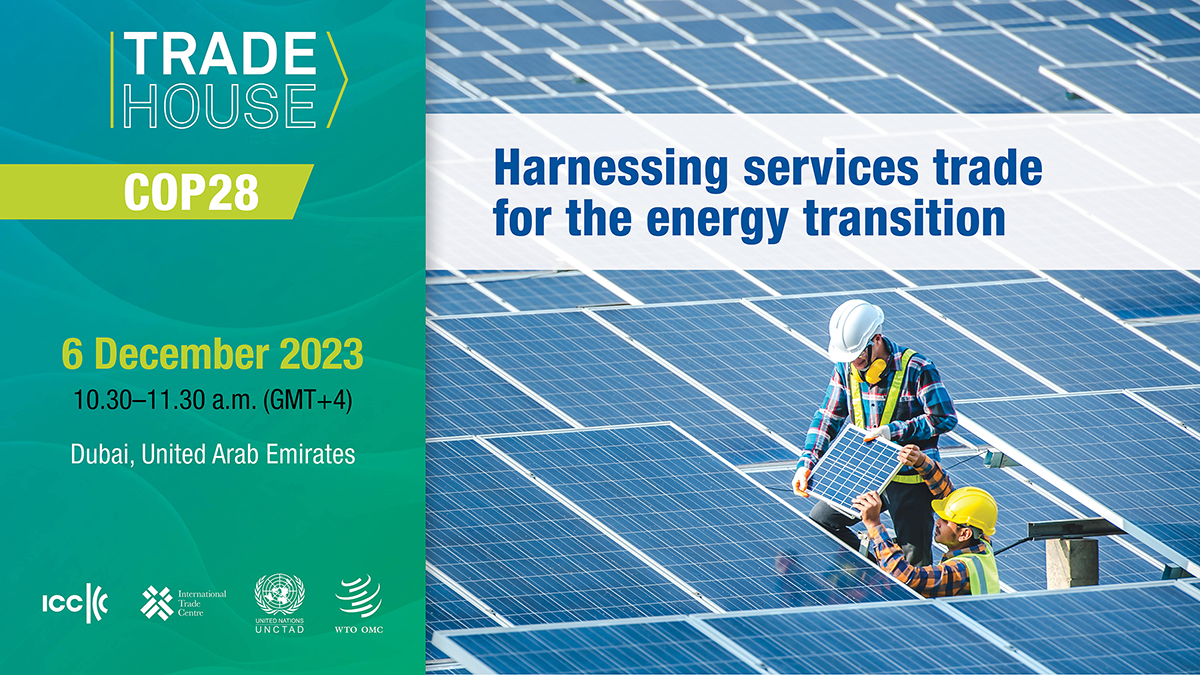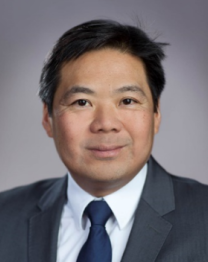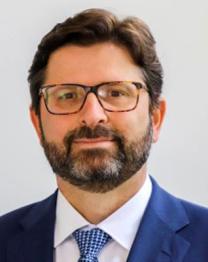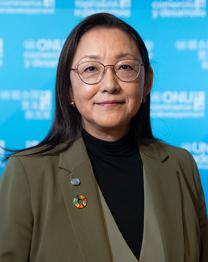
Services are integral to all stages of energy transition projects on the ground, from engineering, legal, and financial services to construction, operation and maintenance, and recycling services.
The availability of high quality, and cost-effective services is therefore a key determinant of the success of these projects. Consequently, it is critical to foster strong capabilities in domestic service suppliers.
At the same time, not all countries could be proficient in all the required service sectors. They need to procure services from foreign suppliers, including those operating locally.
Trade and investment policy regimes thus critically affect the outcomes of energy transition projects.
This session will provide an opportunity for representatives from governments, regional organizations and the private sector to share insights and experiences in leveraging trade-in services to promote an inclusive low-carbon transition.
The expected outcome is an overview of some of the critical elements in strengthening the domestic service sectors through trade.
It will be guided by the following questions:
- Which services are critical for energy transition? What are some of the most pressing challenges faced by countries in supplying these services?
- How can trade address these challenges?
- What’s the scope for regional and international cooperation? What are some of the innovative examples?
This event will be live streamed
Programme
Moderator:
- Ms. Miho Shirotori, Acting Director, Division on International Trade and Commodities, United Nations Conference on Trade and Development
Panelists:
- Mr. Aik Hoe Lim, Director, Trade and Environment Division, World Trade Organization secretariat
- Mr. Bernardo Busel Niedmann, Special Advisor, Centre for Global Cooperation, Danish Energy Agency, Denmark
- Ms. Trudi Hartzenberg, Executive Director, Trade Law Centre for Southern Africa, South Africa
- Mr. Lucas Ferraz, Secretary International Affairs of the State of São Paulo, Brazil
- Mr. Abdelmuti Ahmed Murad, Head, Energy Strategies and Policies Division, Ministry of Energy and Infrastructure, United Arab Emirates
Miho Shirotori is the Head of the Trading Systems, Services and Creative Economy Branch in UNCTAD's Division on International Trade and Commodities.
She leads a team of experts assessing pathways to improve the developmental impact of trade by negotiating and implementing trade agreements, strengthening policy-making capacity in services trade, and promoting the creative economy to achieve more inclusive economic diversification.
Miho's own expertise includes the development impacts assessment of preferential market access for developing countries, most notably the Generalized System of Preferences (GSP).
Miho has been contributing her technical and institutional knowledge to support UN Member States in shaping decisions to promote more equitable trade across multilateral, North-South, and South-South trade frameworks.
Miho demonstrates a strong track record of leadership and team management within the international organizational context.
She holds master's degrees in economics (London School of Economics and Political Science, international economics (Graduate Institute of International and Development Studies, Geneva), and public administration (Harvard Kennedy School).

Aik Hoe Lim is Director of the Trade and Environment Division at the World Trade Organization and leads its work on environmental sustainability, climate change and trade, as well as on the Agreement on Technical Barriers to Trade. In this role, he has strengthened WTO's partnership with UNEP as well as other international environmental organizations. He led the establishment of WTO's Trade and Environment Week, which is now an annual flagship event for the organization. He joined the WTO in 1999 and served in the External Relations Division, the Director-General's Cabinet and the Trade in Services Division. He was previously Counsellor to two WTO Director-Generals, Advisor to the Director‑General's Consultative Group, and Secretary to WTO committees, working groups and negotiating bodies on services trade and domestic regulation. He represents the WTO in the UN Environmental Management Group and the UN Framework Convention on Climate Change, and is a member of the Advisory Board of the UNEP Global Environmental Outlook. Some of his publications include contributions to the "Research Handbook on Climate Change and Trade Law" (2017); "Win-Win: How International Trade Can Help Meet the Sustainable Development Goals" (2017); and an edited volume on "WTO Domestic Regulation and Services Trade" (2014).

Secretary for International Affairs - State of Sao Paulo, Brazil. Former Secretary for Foreign Trade at the Ministry of Economy of Brazil and Brazil's senior director for the New Development Bank (NDB) and for the Latin American Development Bank (CAF).
He served as Brazil's alternate governor for the Inter-American Development Bank and for FONPLATA Development Bank. Held positions as senior advisor to the World Bank, UNCTAD, the American Chamber of Commerce for Brazil and the International Chamber of Commerce. Graduated in Chemical Engineer, holds a doctorate in economics from Getulio Vargas Foundation in São Paulo and is one of the coordinators of the Brazilian Chair at the World Trade Organization.
Ms. Trudi Hartzenberg is the Executive Director of tralac (Trade Law Centre) based in the Western Cape region of South Africa.
Her research is in the areas of international trade, competition policy, industrial development and Africa's integration agenda. She currently serves on the WTO Chairs Advisory Committee and is a member of the Committee for Development Policy of the United Nations Economic and Social Council (ECOSOC).
Bernardo Busel Niedmann serves as a Special Advisor of the Danish Energy Agency. He has been working as specialist in regulation of renewable energy in government-to-government programs with Colombia, Brazil, Ukraine, Ethiopia, Indonesia, Türkiye, South Korea and Chile.
Before joining the Danish Energy Agency in 2021, he was a partner in a law firm in Santiago de Chile, where he specialized in energy law working with clients from more than twenty countries, focusing his practice in litigation and transactional advice in the energy sector. He has been ranked by Legal 500 and Best Lawyers® as a leading practitioner in the energy law field.
Bernardo Busel Niedmann holds an Advanced Master of Laws (Energy Law) from the Universities of Copenhagen, Groningen, Aberdeen and Oslo and an LL.B. degree from Universidad Adolfo Ibáñez.




